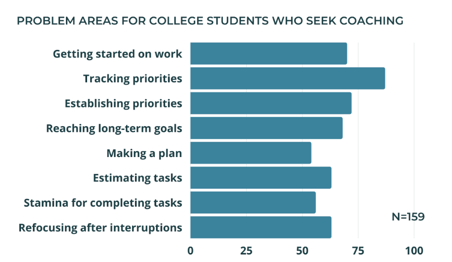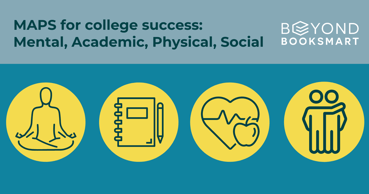The college environment presents greater demands for self-management than most young adults have ever experienced. Add in the fallout from pandemic disruptions and we really do have a perfect storm of circumstances that have left many college students anxious, depressed, and overwhelmed.
disruptions and we really do have a perfect storm of circumstances that have left many college students anxious, depressed, and overwhelmed.
Why are college students struggling?
Consider a few of these scenarios to give you a sense of how different challenges can play out for a student who:
- Has social anxiety and is expected to contribute in class and participate in group projects
- Has ADHD and forgets to add travel time to their classes now that they are in-person again
- Procrastinates on work they feel is too boring or irrelevant
- Has slow processing speed and falls behind on class readings
- Has a roommate who binge drinks and disrupts sleep or study time
- Is too depressed to join clubs or participate in social activities
- Feels they should be able to understand complex material without any help
- Insists all work be “perfect” before they can pass it in
It’s not hard to imagine exactly why college students living through one or more of these scenarios would become overwhelmed. So what's at the root of these challenges?
The nature of college students’ challenges
On the mental health side, a sobering 2021 article by the Mayo Clinic revealed up to 44% of college students reported having symptoms of depression and anxiety. Half of the students surveyed reported feeling overwhelmingly anxious in the past year. Even while more students are struggling, up to 75% are reluctant to seek help.
On the academic and life skills side, our own research of college students who come to Beyond BookSmart for Executive Function coaching provides us with a more detailed picture of why students become overwhelmed with their academic demands. They struggle primarily in these areas:
Procrastination: 70% reported having a hard time putting aside fun activities to get work done.
Prioritizing: 87% reported that they often or very often lose track of all the responsibilities or deadlines they have to meet, 72% specifically noted that they frequently struggle to set priorities when they're busy.
Planning: 68% reported frequently having trouble reaching long-term goals, and 54% shared that they often or very often have trouble making a plan.
Time management: 63% reported struggling with anticipating how long tasks will take.
Sustained attention: 56% shared that they regularly run out of energy before finishing a task and 63% report difficulty getting back on track with work if they’re interrupted.
You can imagine how challenges in just one of these areas can make it tough for a student - but typically we see students struggling in several areas at once.
MAPS for College Success: A Framework for Preventing Crises
Given that these challenges are widespread, how do we help students prevent academic crises? And how can we help students maintain their emotional and physical wellbeing in the process? Parents often worry about their college students “burning out” by taking on too many activities - or not taking care of their health. All of these are reasonable concerns, yet there’s no blanket answer that solves them all. Each student is an individual with their own set of life experiences and circumstances that impact their daily functioning. The encouraging news is that we’ve seen many college students achieve their goals regardless of learning disabilities such as ADHD or dyslexia and mental health challenges such as depression or anxiety.
As coaches, we find that the most successful college students come to the table with a great deal of self-knowledge and capacity to reflect. They can answer questions like: Who am I as a learner? What conditions do I need to be successful, happy, productive, and healthy?
Here’s a framework we’ve developed that helps encourage students to take a mindful approach to prepare for meeting college demands in a balanced, healthy way.
.pdf.png?width=566&name=Webinar%2022422%20(2).pdf.png)
The MAPS framework stands for Mental, Academic, Physical, and Social - 4 areas that are interdependent in a student’s overall wellbeing. A parent, coach, teacher, or counselor can help facilitate this exploration. The same questions are posed for each area, starting with “What I need.” The idea is to have the student think deeply about what specifically they need in each of these areas and write them down in as much detail as possible -because this provides their individual roadmap for being successful.
Here are some examples of what students might put in each of the 4 areas for “What I need”:
Mental health: Daily meditation or quiet time, weekly sessions with a counselor, prescribed medication
Academic health: A quiet place to do work, a tutor for my math classes, prepare for exams in small chunks over time
Physical health: Exercise, lots of water, salads 3x a week, at least 7 hours of sleep every night
Social health: Daily time with friends as a break from work, a close friend to confide in, team sports, club activities
See how this starts to paint a very specific and individualized picture - a "map" - to follow?
The next question involves determining how the student keeps their needs in mind. For example, they might set reminders on their phone to meditate or take medication or meet a friend for breakfast. They may put a checklist on their desk to remember to review their notes daily or keep up with their reading. They may find an accountability buddy or coach who can help them get to the gym or follow through on an intention to attend office hours for a professor. There are many ways to keep needs in mind - as long as there is some method noted that the student is willing to do.
The last piece of MAPS involves identifying specific resources in each area that can help them - for Mental health it may be their therapist or a counseling service on campus. The key is having the essential contact information documented ahead of any urgent need. (Here’s where you can download a worksheet for the MAPS framework.) The completed MAPS worksheet is a resource students can return to often - especially when starting to feel overwhelmed - and ask themselves “What am I missing? Who can I reach out to for support?”
The Takeaway
Consider what is needed for Mental, Academic, Physical, and Social health - not only to deal with stress, but also as a way to prevent crises in the first place. And while the MAPS framework was designed primarily for college students, high schoolers can benefit just as much from a mindful exploration into these 4 zones to help them successfully navigate the pressures of their demands, as well. Encouraging students to develop a web of support extending beyond parental oversight helps students learn essential self-advocacy skills - and prepares them to thrive and live independently.
Download our worksheet to complete your own MAPS plan and pave a personal roadmap towards success and balance.
Photo by energepic.com from Pexels


